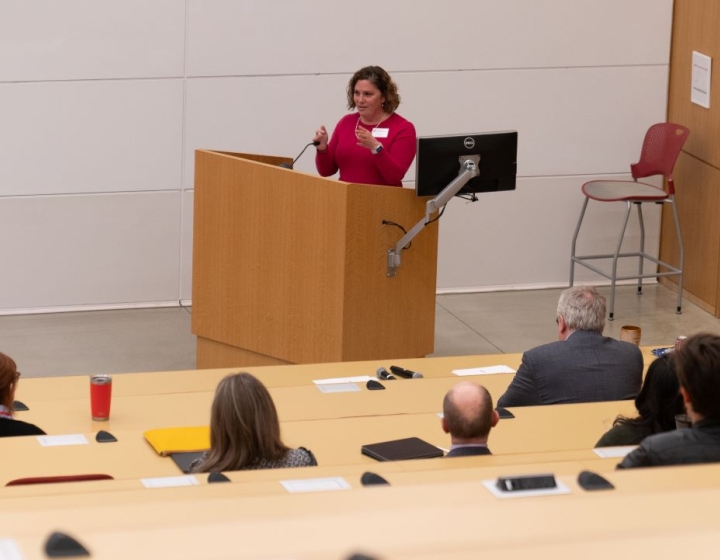Cornell advances reproductive health with cross-campus symposium
On April 14-15, 2025, the Cornell University College of Veterinary Medicine (CVM) hosted the CoRe Cornell Women’s Health Symposium, titled “Advancing reproductive health through basic and clinical research.” Held at CVM’s Schurman Hall, the event united researchers and students from Cornell’s New York City and Ithaca campuses, and highlighted Cornell’s strengths in clinical and basic research across all areas of reproductive health sciences.
Sponsored by the Academic Integration Program and the Cornell Reproductive Sciences Center (CoRe), the conference featured presentations and discussions on a wide range of topics, including engineering innovations in reproductive medicine, menopause and reproductive aging, gamete and gonadal biology, and maternal-fetal medicine.
Welcome remarks were given by conference organizer Dr. Paula Cohen, associate dean of research and graduate education, professor of genetics and director of CoRe, followed by comments from Cornell University President Dr. Michale Kotlikoff and the Austin O. Hooey Dean of Veterinary Medicine Dr. Lorin Warnick, D.V.M., Ph.D.’94.
Following the opening talks, attendees participated in various sessions and workshops. The first day’s sessions focused first on nutrition, aging and cancer, featuring talks on topics like testicular germ cell tumors, ovarian carcinoma origins, and perinatal mental health. The following session focused on reproductive health and the environment, and featured presentations on gestational diabetes and periconceptional arsenic exposure.
The second day of the symposium started with a session focused on assisted reproduction and contraception; technological advances in reproductive health; and stem cell technology in reproductive medicine. The talks covered topics ranging from quantitative ultrasound imaging, to male genome competence, to cellular senescence in ovaries.
In addition to the scientific sessions, the symposium included a poster session where early-career scientists showcased a diversity of projects such as, “Daily vocal function throughout the menstrual cycle,” and “Optimizing enzymatic protocols for mouse oocyte isolation across various follicular stages.”
After two days of knowledge-sharing and connection, the event concluded with remarks from Cornell University Provost Dr. Kavita Bala, who noted the scientific conference came at a pivotal time. “We are in a challenging time of transition for higher ed, but there is much to be gained in coming together for events like this,” she said. “What you do matters, and is more important now than ever before.”
Written by Lauren Cahoon Roberts
Photos by Carol Jennings








